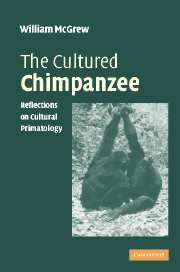Crossref Citations
This Book has been
cited by the following publications. This list is generated based on data provided by Crossref.
Whiten, Andrew
Horner, Victoria
and
de Waal, Frans B. M.
2005.
Conformity to cultural norms of tool use in chimpanzees.
Nature,
Vol. 437,
Issue. 7059,
p.
737.
Davidson, Iain
and
McGrew, William C.
2005.
STONE TOOLS AND THE UNIQUENESS OF HUMAN CULTURE.
Journal of the Royal Anthropological Institute,
Vol. 11,
Issue. 4,
p.
793.
Sarringhaus, Lauren A.
McGrew, William C.
and
Marchant, Linda F.
2005.
Misuse of anecdotes in primatology: lessons from citation analysis.
American Journal of Primatology,
Vol. 65,
Issue. 3,
p.
283.
McGrew, W.C.
Pruetz, J.D.
and
Fulton, S.J.
2005.
Chimpanzees Use Tools to Harvest Social Insects at Fongoli, Senegal.
Folia Primatologica,
Vol. 76,
Issue. 4,
p.
222.
Whiten, Andrew
2005.
The second inheritance system of chimpanzees and humans.
Nature,
Vol. 437,
Issue. 7055,
p.
52.
Berry, Christopher J.
2006.
Aristotle, Hobbes and Chimpanzees.
Political Studies,
Vol. 54,
Issue. 4,
p.
827.
Cronk, Lee
2006.
Bundles of insights about culture, demography, and anthropology.
Evolutionary Anthropology: Issues, News, and Reviews,
Vol. 15,
Issue. 5,
p.
196.
Matsuzawa, Tetsuro
2006.
Cognitive Development in Chimpanzees.
p.
3.
Nakamura, Michio
and
Nishida, Toshisada
2006.
Subtle behavioral variation in wild chimpanzees, with special reference to Imanishi’s concept of kaluchua.
Primates,
Vol. 47,
Issue. 1,
p.
35.
Horner, Victoria
Whiten, Andrew
Flynn, Emma
and
de Waal, Frans B. M.
2006.
Faithful replication of foraging techniques along cultural transmission chains by chimpanzees and children.
Proceedings of the National Academy of Sciences,
Vol. 103,
Issue. 37,
p.
13878.
McGrew, W C
2006.
Encyclopedia of Life Sciences.
Biro, Dora
Sousa, Cláudia
and
Matsuzawa, Tetsuro
2006.
Cognitive Development in Chimpanzees.
p.
476.
Heaton, Jason L.
and
Pickering, Travis Rayne
2006.
Archaeological Analysis Does Not Support Intentionality in the Production of Brushed Ends on Chimpanzee Termiting Tools.
International Journal of Primatology,
Vol. 27,
Issue. 6,
p.
1619.
Ohashi, Gaku
2006.
Cognitive Development in Chimpanzees.
p.
439.
Krief, Sabrina
Wrangham, Richard W.
and
Lestel, Dominique
2006.
Diversity of items of low nutritional value ingested by chimpanzees from Kanyawara, Kibale National Park, Uganda: an example of the etho-ethnology of chimpanzees.
Social Science Information,
Vol. 45,
Issue. 2,
p.
227.
Lycett, Stephen J.
Collard, Mark
and
McGrew, William C.
2007.
Phylogenetic analyses of behavior support existence of culture among wild chimpanzees.
Proceedings of the National Academy of Sciences,
Vol. 104,
Issue. 45,
p.
17588.
Lewis, M. E.
and
Werdelin, L.
2007.
Hominin Environments in the East African Pliocene: An Assessment of the Faunal Evidence.
p.
77.
Fowler, Andrew
and
Sommer, Volker
2007.
Subsistence Technology of Nigerian Chimpanzees.
International Journal of Primatology,
Vol. 28,
Issue. 5,
p.
997.
McGrew, W C
2007.
Encyclopedia of Life Sciences.
Szabó, Katherine
Brumm, Adam
and
Bellwood, Peter
2007.
Shell Artefact Production at 32,000–28,000 BP in Island Southeast Asia.
Current Anthropology,
Vol. 48,
Issue. 5,
p.
701.





